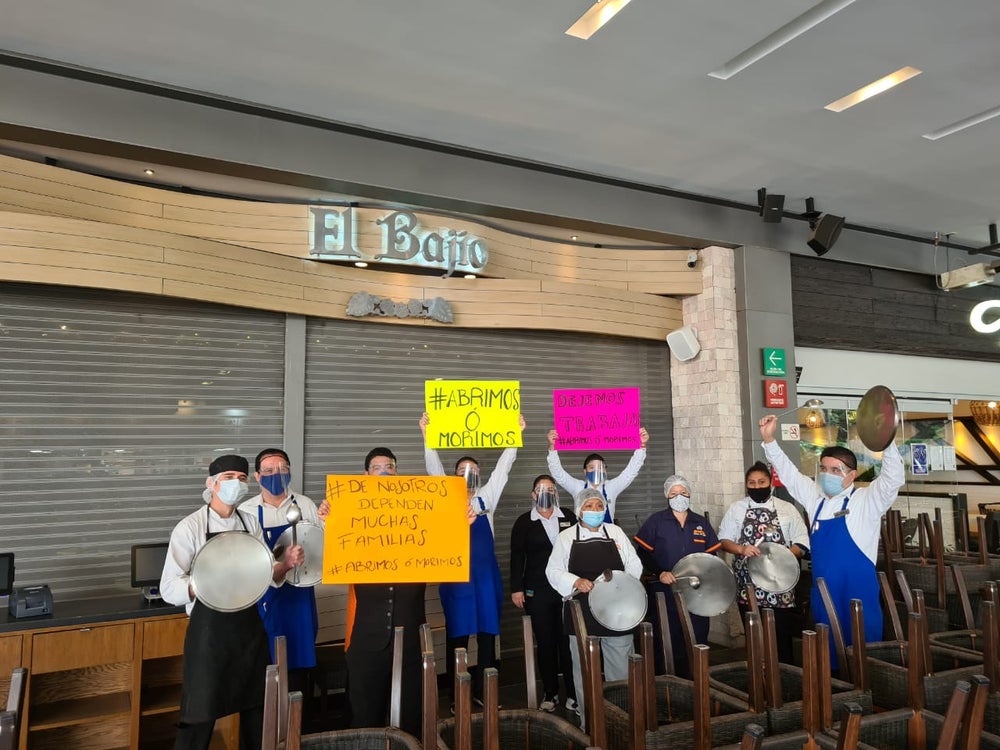January 13, 2021 6 min read
Last Monday, Mexican restaurateurs and the National Chamber of the Restaurant and Seasoned Food Industry ( Canirac ) launched an action on social networks called “We Open or We Die” to ask the authorities to reopen their businesses that have been closed since 19 December due to the advance of the COVID-19 pandemic .
With cacerolazos, cooks, waiters, cleaning workers and owners begged to be able to operate again because they say they are at the limit of their economic capacities to keep their businesses alive.
“Our working capital has already run out. From the small premises to the large chains, we have paid more than we have entered. Formal restaurants continue to pay taxes, cover social security and comply with all our obligations ”, Raúl Ramírez Degollado, general director of Restaurantes El Bajío , explained to Entrepreneur en Español. “The time limit has come. We have water up to our necks. We have to open. Where are we going to get more money from?
Restaurants are not considered on the list of essential economic activities and have been without activity for three weeks due to the rebound in infections from the pandemic in the country that has brought hospital occupancy to 90% in areas such as the Valley of Mexico.
Mexico City has 369 thousand confirmed COVID-19 cases out of the 1.5 million registered throughout the country.

Image: Courtesy Restaurants El Bajío
This is the second closure that the industry faces in the health emergency so far, since in April there was a first stoppage of activities that lasted 107 days. This second closing occurred precisely in one of the most important sales seasons for the restaurant industry, since in December people usually get together to say goodbye to the year.
These stoppages of activities have resulted in more than 13,500 restaurants having closed their doors permanently since the beginning of the pandemic, including some historic places such as Café La Pagoda .
In fact, Canirac figures show that eight out of 10 restaurants in the city could not reopen if the ceasefire is extended further.
“There are some businesses that have managed to move their products through food delivery such as pizzerias and sushi shops, but the traditional restaurant is the one that is badly damaged by this situation,” says Ramírez Degollado.
El Bajío Restaurants participated in the protest without opening their facilities, as did restaurants such as Grupo Fisher’s, Grupo Sonora Grill, Potzollcalli and IHOP – who received fines, closures and warnings for opening at red light -, because they could not be given the luxury of paying a fine like the one these brands received.
“We no longer have savings or credit to continue with our obligations, which are much greater than our income. The vast majority of restaurant companies qualify for a commercial bankruptcy, without problem ”, stated the director of Restaurantes El Bajío.

Image: Courtesy Restaurants El Bajío
Meeting with the authorities to seek balance
This Wednesday the Secretariat for Economic Development (Sedeco) and the Digital Agency for Public Innovation (ADIP) of Mexico City will meet at 6 in the afternoon with representatives of the industry to find a solution.
Claudia Sheinbaum , head of Government of Mexico City, indicated that she will attend the work table, but stressed that “everyone has to comply” with the health regulations. For his part, the Secretary of Government of the capital, José Alfonso Suárez del Real , declared that a “balance must be sought between the health needs and the economic needs of companies.”
The general director of Restaurantes El Bajío remarked that there has been unequal treatment with the informal sector because markets have continued to operate, while formal restaurants have had to stop their operations.
“We have followed everything that the authority has asked us and even more things to minimize infections and we totally agree that public health is a priority. But we also have to take into account economic health, ”said Ramírez Degollado. “Completely shutting down the economy is a rich country strategy. The virus is not going to go away and these periodic closures only impoverish us without making the health problem go away ”.
What do restaurateurs ask for?
The call of the industry is that they be allowed to operate with at least 30% of their capacity, that they be given an approximate date to be able to resume activities to be able to comply with the payment of their payroll, as well as opening conditions to be able to ensure to the entire distribution chain related to your industry.
“We agree that not all restaurateurs have behaved well. There are some who did abuse, but those of us who do comply just want to work. We are not in rebellion nor do we want to confront the government, we are crying out for survival ”.
Ramírez Degollado ended by recalling that most of the food outlets are not big magnates, but normal businessmen. With a broken voice, the director remarked “El Bajío was founded by my parents 48 years ago. Our last name is Ramírez, we are normal people and we are in a very difficult situation ”.





